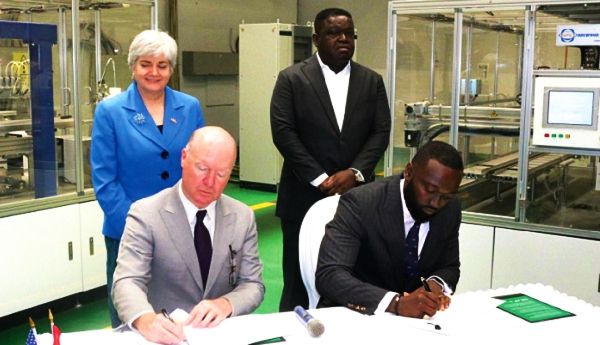
USTDA provides grant for feasibility studies on solar energy
The United States Trade and Development Agency (USTDA) has approved a grant of $950,000 for feasibility studies on solar energy production to be developed in six of the 20 dioceses of the Catholic Church in Ghana.
The feasibility studies, to be carried out within a six-month period, will provide the technical and financial information to enable AEG International LLC, a US-based company, and its Ghanaian partners, Strategic Security Systems International, to start the building of small-scale solar systems at an estimated cost of $15 million.
Advertisement
The two companies will build small-scale photovoltaic solar systems that will be assembled in Ghana using US manufactured inverters, batteries and other solar power system equipment.
About 310 schools, 28 health facilities, as well as 500 other buildings and offices in the six dioceses of Keta-Akatsi, Tamale, Techiman, Koforidua, Kumasi and the Accra Archdiocese, will benefit from the solar project.
Long-term development
Speaking at a signing ceremony at Kpone near Tema yesterday, the US Ambassador to Ghana, Ms Stephanie S. Sullivan, said the project could contribute considerably towards the provision of light for health professionals to undertake child deliveries, as well as provide the electricity needed for respirators and power other equipment used for the storage of vaccines and other important medicines.
She described the initiative between the two companies as an excellent example of how companies in Ghana could increase local content and create jobs, as well as solve issues that were critical to the country’s long-term development.
Ms Sullivan said the project was also an example of a best-value procurement approach with a long-term vision and presented an incredible opportunity for Ghana to adapt to the use of solar, since sunshine was in abundance in the country.
“The US and Ghana are each bringing something to the table to help improve the lives of thousands of people through this project, so they can fulfill their potential and contribute to national development,” she added.
Catholic Church
The President of the Ghana Catholic Bishops Conference, the Most Rev. Philip Naameh, commended the US government and the USTDA for the grant and said the motivation to transition to a solar-powered system of lighting followed the desire to protect the environment by adopting a climate-smart technology.
He called for an extension of the project to cover the remaining 14 dioceses of the church, adding that the focus presently was to ensure that poorer people within the various dioceses became the initial beneficiaries of the project.
"Whenever the Catholic Church undertakes development projects, it is more concerned about the poorest of the poor and this explains our presence in the outlandish areas where there is no development of any kind,” he said.
The Most Rev. Naameh, therefore, called on the AEG to consider its pricing in order to help the church meet its commitment to the poor.
AEG President
The President of AEG International, Mr Tod Skinner, for his part, said the project would benefit Ghanaians by bringing solar power to schools, hospitals, clinics among others, as well as facilitate the creation of jobs for the people.
The Chairman of Strategic Security Services, Dr Francis Akuamoah Boateng, pointed out the need for Ghana to move faster to harness solar energy for development.
“This project is not only an opportunity to show the world that Ghana and Africans, indeed, have a vision for themselves but also how mutually beneficial collaborations can and should look like,” he said.
Pending the outcome of the feasibility studies, phase one of the project is to deliver about six megawatts of solar power to 650 beneficiary institutions.




